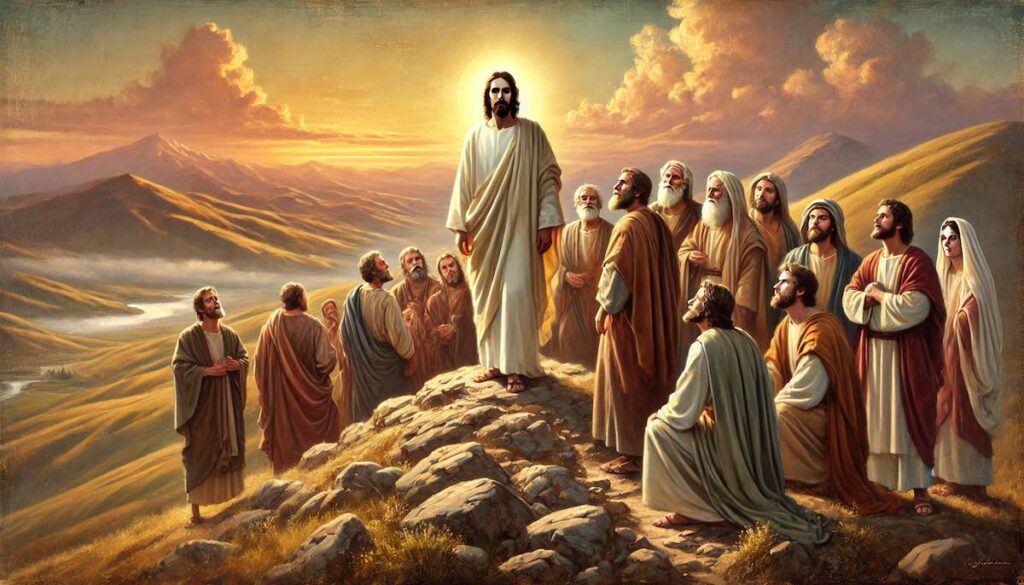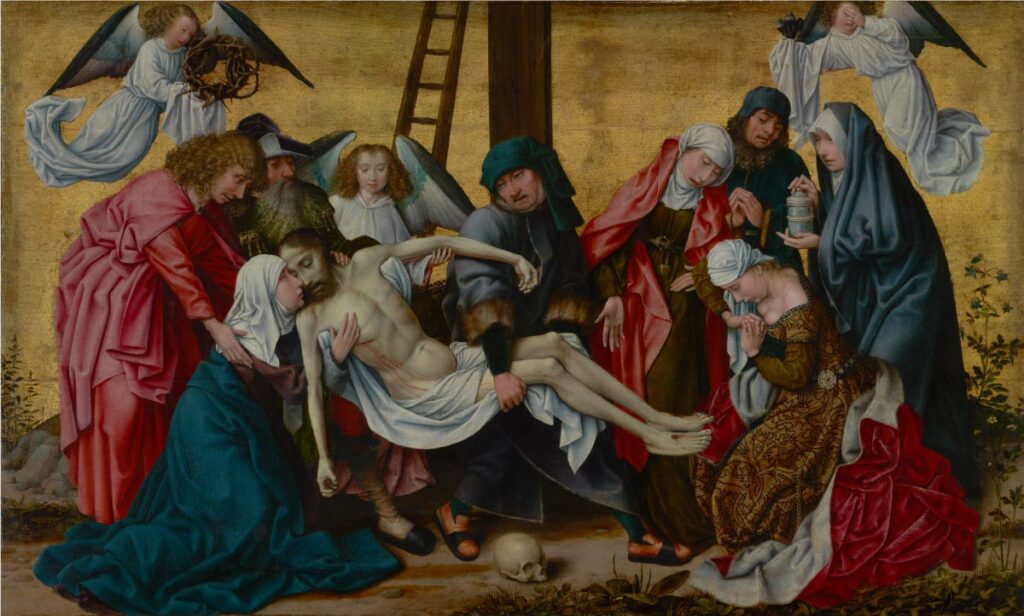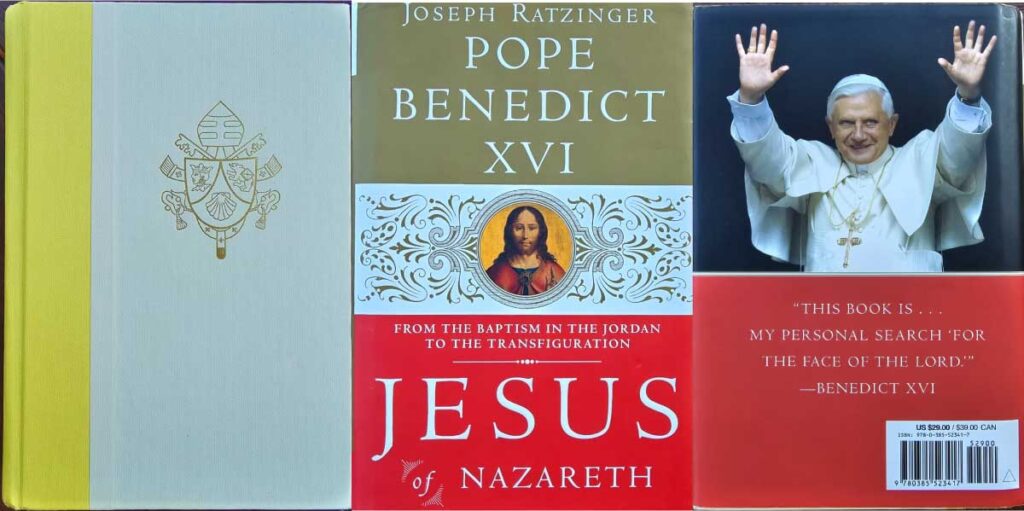The calling of the Twelve Disciples by Jesus was not just an act of gathering followers. It was the creation of a new spiritual family, a group of men who would shape the future of the Church. This event marked a pivotal moment in Christian history. Jesus, the new patriarch, summoned his disciples from among his followers, establishing a profound connection between them and God. This blog explores the significance of the Twelve and their mission, drawing on Pope Benedict XVI’s reflections in Jesus of Nazareth.
The Divine Calling of the Twelve
Jesus’ selection of the Twelve Apostles is a deeply theological moment. As Benedict explains, the calling of the disciples is a “prayer event.” The event occurs on a mountain, a place symbolising communion with God, where Jesus prays throughout the night (Luke 6:12-13). In this dialogue with the Father, the Twelve are “begotten in prayer,” and this is significant. As Benedict notes, “You cannot make yourself a disciple—it is an event of election.” It is the Father’s will that Jesus calls these men, underscoring the spiritual nature of their calling.
The Gospel of Mark describes how Jesus “appointed twelve” (Mark 3:14). The word “appointed” is loaded with significance. Benedict explains that this word, literally meaning “made,” links the disciples to the priesthood, as in the Old Testament, where priests were “made.” This act of “making” the Twelve mirrors the creation of a new Israel, a restoration of the twelve tribes.
The Symbolism of the Twelve
The number twelve holds symbolic importance in both Jewish tradition and Jesus’ ministry. The twelve tribes of Israel represent the roots of the Jewish people. After the Exile, only the tribe of Judah remained prominent. However, by appointing the Twelve, Jesus is restoring all of Israel, pointing toward the fulfilment of God’s promise to gather his people. Benedict eloquently states, “The Twelve stand as the patriarchs of this universal people founded on the Apostles.”
Furthermore, Jesus reveals himself as the new Jacob, with the reference to “angels ascending and descending upon the Son of Man” (John 1:51). This image recalls Jacob’s dream of a ladder connecting heaven and earth (Genesis 28:12), with Jesus himself becoming the ladder, the “gate of heaven.” As Benedict notes, Jesus is the true patriarch of the definitive Israel, symbolising a new beginning for all humanity.
The Apostles’ Double Mission
Jesus called the Twelve not only to be with him but also to be sent out to preach (Mark 3:14). This dual mission, to be with Christ and to proclaim his message, is a foundation of discipleship. The Apostles needed to know Jesus intimately before they could effectively spread his message. As Benedict writes, “They must be with him in order to get to know him.”
The Apostles’ mission involved preaching the Kingdom of God and casting out demons. Their work was not just verbal but deeply spiritual. The world, as Benedict describes it, was seen as being “possessed” by powers of darkness, and Christ’s mission was to liberate it. “To ‘exorcise’ the world,” Benedict writes, “is a permanent, central task of the messengers of Jesus Christ.” The Apostles were given authority over unclean spirits (Matthew 10:1), with the power to heal and exorcise representing the authority of God’s Kingdom over evil.
Liberation and Healing
Alongside the mission to preach, Jesus empowered the Twelve to heal the sick and cast out demons (Matthew 10:1). This dual authority shows that Jesus’ mission is both spiritual and physical, concerned with the wholeness of humanity. Benedict highlights that healing, like preaching, points to a deeper reality—the Kingdom of God. The miracles of Jesus and the Apostles were signs of God’s grace and power over the world.
Benedict notes, “The healing power of the messengers of Jesus Christ is opposed to the spirits of magic; it exorcises the world in medical terms as well.” This powerful imagery highlights how the authority to heal also freed the world from superstitious fears and reliance on magical practices. Healing was an integral part of the apostles’ mission, a foretaste of the ultimate healing found in God’s Kingdom.
The Diverse Group of the Twelve
The Twelve Disciples were far from homogeneous. They included fishermen, zealots, and even a tax collector. Simon the Zealot and Judas Iscariot were associated with radical movements, while Levi (Matthew) worked for the Roman authorities as a tax collector. This diversity within the group is remarkable, reflecting the universal nature of Jesus’ mission.
As Benedict notes, this diverse group “personifies the Church of all ages.” The zeal of the Zealots had to be purified by Jesus’ example of non-violence and love, while others, like Matthew, needed to abandon their collaboration with corrupt systems. The group’s internal differences emphasise the unifying power of Christ’s mission.
The Seventy Disciples and the Universal Mission
In addition to the Twelve, Luke mentions that Jesus appointed seventy (or seventy-two) disciples and sent them out with a mission similar to that of the Apostles (Luke 10:1). This number is also symbolic. Seventy was seen as the number of nations in the world, derived from Old Testament texts (Deuteronomy 32:8 and Exodus 1:5). These disciples represent the universal scope of Jesus’ message, as Benedict writes, “The number seventy… is symbolic of the whole world.”
This group symbolises the universal mission of the Church, reaching beyond the Jewish people to the Gentiles. The early Christian community quickly spread among the “God-fearers”—non-Jewish pagans who were drawn to the faith of Israel but hesitant to fully convert to Judaism. Paul and the other Apostles found many of their earliest converts among these seekers.
Conclusion: The New Family of Jesus
The formation of the Twelve Disciples was not just a historical event; it was the creation of a new spiritual family. This family, founded on Jesus and the Twelve, represents the restored Israel and the universal mission of the Church. Through their preaching, healing, and exorcism, the Apostles were tasked with liberating the world from the powers of darkness and bringing it into the light of Christ.
Jesus’ mission was not only for the Jewish people but for all nations. The appointment of the Twelve and the Seventy marks the beginning of a global outreach that would change the course of history. As Pope Benedict XVI reflects, the Apostles’ mission was to “exorcise” the world and make it rational through faith in the one true God.
See the other chapter reviews of the first volume on Jesus of Nazareth here.




